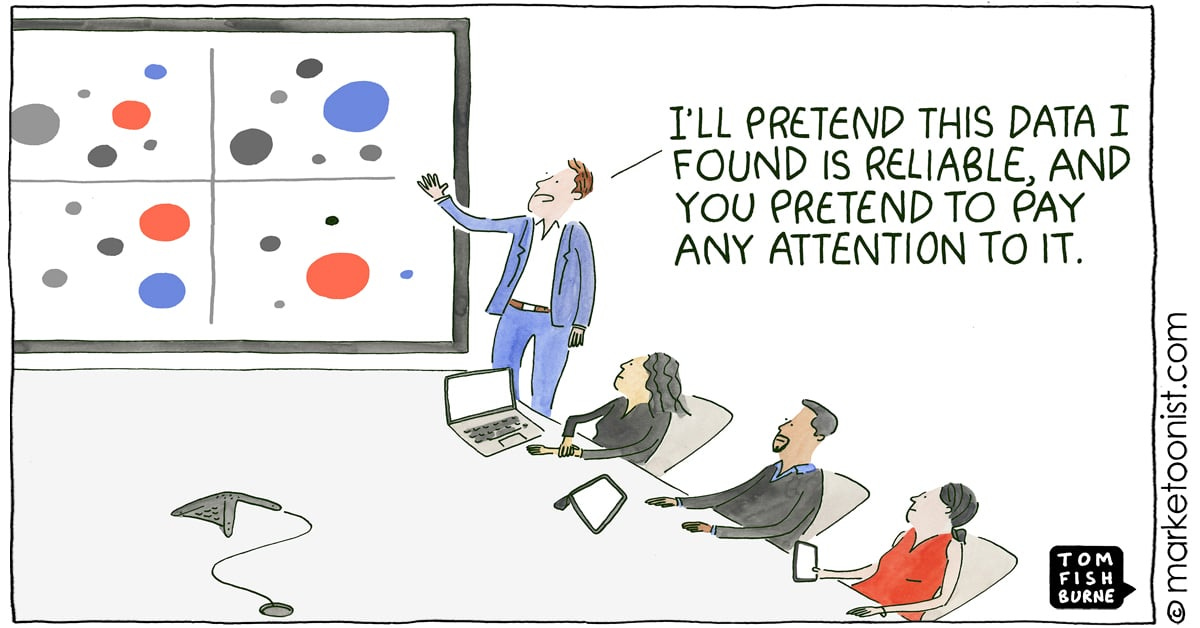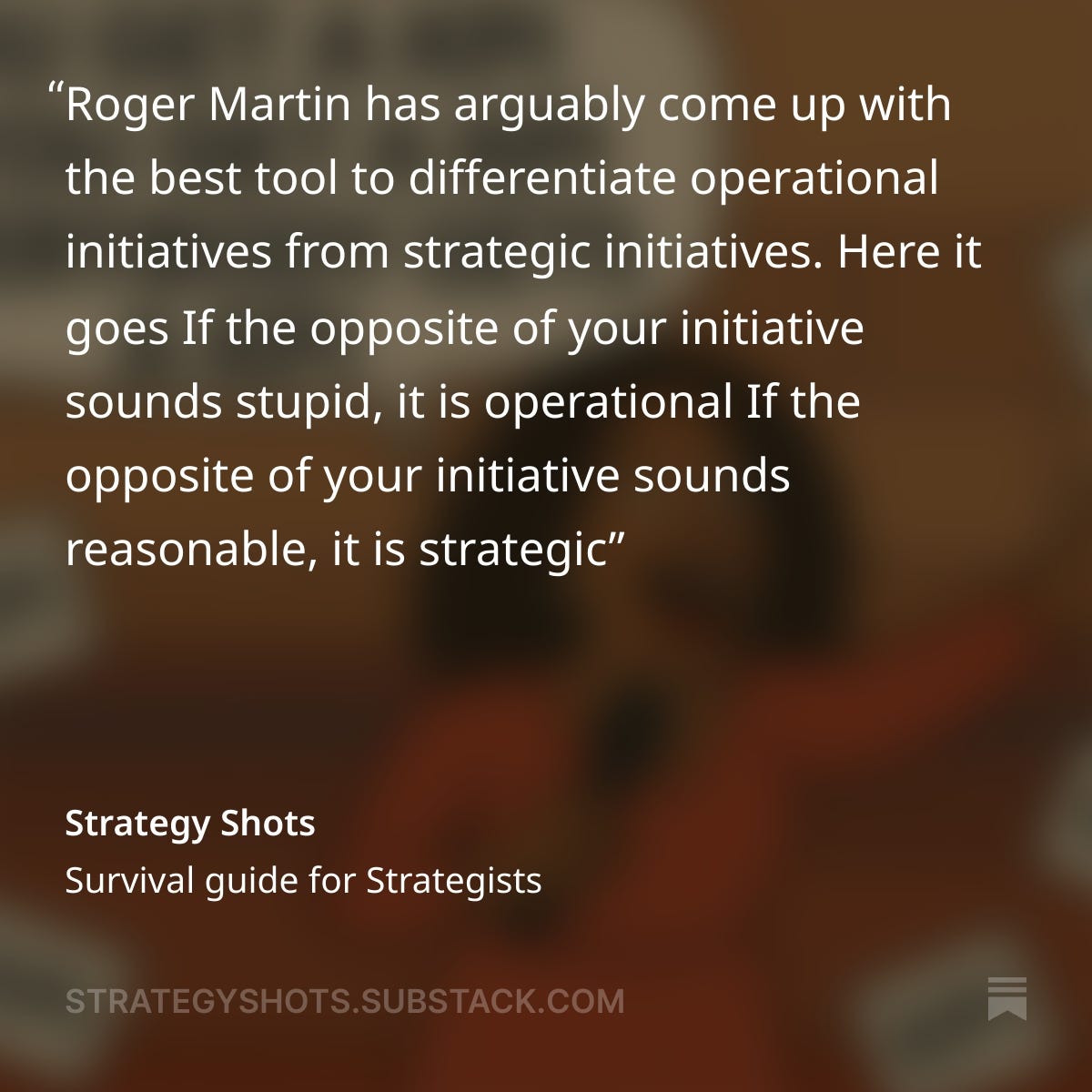This week, in the spirit of my earlier posts on The 5 commandments of strategy and Survival guide for strategists, I thought I would touch upon yet another topic which deserves our attention - the myths about strategy at the workplace.
To begin with, it is important to understand what I mean by myth here. Myth is defined as a commonly or widely held but false belief or idea. Now I am not averse to myths as long as they are innocuous. I have thrown many coins in fountains or wished on shooting stars to no avail :)
In this piece, I would try to spell out some of these myths and bust them :). This list is non-exhaustive and I might write about this topic again in the future.
Myth 1: Good strategy can be fully backed by data
Perhaps the most common myth about strategy is that any good strategy can be fully backed by solid data analysis.
I tend to have a very simple view about data. I see data as two folds - Operational data and Market/Consumer data.
Operational data is any data that is generated because of how a process or machine works. This data usually is part of the functioning of a process and as this process is repeatable, the patterns and insights in this data are solid. As these processes or machines will continue to work in the same manner in the future, this data can be used to identify trends or faults, predict outcomes based on changes in variables and in the end improve operational efficiency. The prediction power of this data set is very high.
Market/Consumer data is data generated as a result of the buying pattern of consumers. This historical data coupled with consumer trends can help project market growth in the short term and long term. This is where it gets interesting. The short term prediction power of this data is moderate but the longer term prediction power (even 4-5 years) is as good as a coin flip. Let me share some examples here:
Blockbuster passed on buying Netflix because their corporate strategy team felt that physical stores will continue to dominate the market.
Mckinsey told AT&T that the mobile phone user market would be only around 900,000 by 2020 while it turned out to be ~100 million.
These were a bunch of smart people who did this analysis and I am sure many of them reached the top of the corporate ladder. So where did it go all wrong?
The challenge here is the over-reliance or even artificial reliance on data to justify strategic moves. Yes data can guide you but it is almost impossible to predict markets accurately in even 3-4 years time frame. Therefore, any good strategy will not be fully backed by data. There will be some leaps of faith in how you imagine the future to evolve based on certain trends and technologies but there is no data set that would be able to prove it.
I will end this myth with one Arabic saying. It goes like this
He who predicts the future lies, even if he tells the truth."
Myth 2: Strategy teams are best made out of ex consultants
How would most corporations go ahead in setting up strategy functions? Well first hire a partner or principal from a management consulting (who wants a better work life balance) to head the function. This person would then hire consultants across the rung of the ladder to then form a team which ends up resembling a management consultant case team albeit with limited resources and lower salaries.
Well I would like to say two things here. First, these consultants are not bad at all (I was one myself :)) but a lot of them have either done no strategy work or don’t even have a grasp of core strategy concepts. Only a very small part of work done at management consulting these days is actually strategy. Second, linked to the point above around data, there is a common assumption (mini myth) that anyone who is a good data analyst is good at strategy. Creativity is a big aspect of good strategy and might be even bigger that data analysis in my opinion.
In my view, while yes ex-consultants could make good strategists in corporate strategy teams they need to be tested by strategy understanding as well as creativity. But the larger point is, a good strategist can be from anywhere (within or outside of the organization) as long as they have the key ingredients of a successful strategist.
Myth 3: Operational efficiency is Strategy
I briefly touched upon this topic in my last post but I wanted to call it out here because while this can be tolerated, it should be made clear that operational efficiency is not strategy unless it is being done to create differentiation.
Every organization wants to be more efficient. They want to lower costs, they want to increase margin. Productivity, Productivity, Productivity. You hear it all around you but it is not strategy. It is strategy only when it creates superior customer value. E.g. Southwest airlines used operational efficiency to provide lower costs and create customer value, but if Delta is running a productivity program to optimize its margin, well then that’s just operational efficiency. And well everyone should try to be operationally efficient but it is not going to create differentiation or higher customer value.
Operational effectiveness is not strategy - Michael Porter
Another important element here and this is just my hypothesis. Operational gains can help create maybe incremental value but they will never get you exponential gains. It is only true strategy that will create exponential gains. Launching the Iphone was strategy, getting it made more efficiently in China or India is operational efficiency.
So while operational efficiency is important and will always be, let us not confuse it for strategy.
Well today we stop at these 3 myths. There are many more myths which I will write about in the future. The key element about myths is that even if you cannot escape them, be aware of them. Just by being aware you are more vigilant :).
Do you know any more of such myths about strategy? Do share them in comments or DMs. I hope you had fun reading this newsletter. See you again next week.
Is there any topic of interest that you would want me to cover in the future - let me know :)








As someone writing about Strategy myself this really resonates with me 🙏🏻 keep up the great work !
It's really interesting stuff. Keep it up!
I don't have the answers or a strong view on these additional ones, but would love to hear about any of the following in the future:
- How important is having relevant industry experience for a strategy team?
- How common is for strategists to have practical functional experience (e.g. marketing, sales) and vice versa?
- How do you price up strategy work?